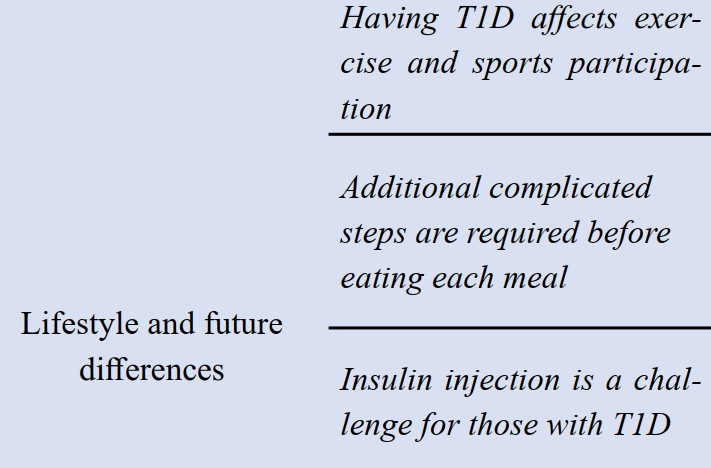EXPERIENCES AND PERCEPTIONS OF LIVING WITH TYPE 1 DIABETES AMONG YOUTH PATIENTS, PARENTS, AND PEERS: A QUALITATIVE STUDY
DOI:
https://doi.org/10.55374/jseamed.v9.215Keywords:
type 1 diabetes, Experiences, youth, adolescent, ThailandAbstract
Background: The incidence of type 1 diabetes mellitus (T1D) among the youth is a global concern. This disease not only poses physical health challenges but also creates emotional and social stigmas. Objectives: The present study aimed to explore the perceptions and experiences of patients with T1D, their guardians, and peers, a topic that has not been extensively investigated in this context.
Methods: Between March and July 2023, an in-depth semi-structured interview was conducted with eight T1D patients aged 10–20 at Phramongkutklao Hospital. Seven mothers and a group of close friends were chosen by the patients and were included in another in-depth interview. Additionally, six groups and one in-depth interview involving 20 participants were held with the youth unrelated to T1D patients at an international private school. The interviews covered general knowledge of T1D, perceptions, daily life experiences, relationships with individuals with T1D, and interpersonal relationships. Thematic analysis was used to analyze the data.
Results: Patients and parents viewed T1D as both severe and manageable, with significant lifestyle challenges, particularly in diet and daily activities, that influenced their life choices and financial stability. Although the patient experienced sudden adaptation to T1D, they developed effective self-care strategies and appreciated the supportive adjustments made by their family. Furthermore, despite proactive management of their condition through new treatments and enhanced knowledge, they encountered social challenges, including support mixed with misunderstandings and stigma. Meanwhile, guardians experienced stress from caregiving and advocated for better treatment access and support. Peers recognized that patients could lead everyday lives with proper management, but they often lacked a comprehensive understanding of T1D, highlighting substantial gaps in societal awareness.
Conclusion: The findings underscore the need for improved diabetes education and support systems to reduce stigma and enhance the quality of life among youth with T1D, particularly through peer and guardian engagement.
Downloads
Metrics
References
Katsarou A, Gudbjörnsdottir S, Rawshani A, Dabelea D, Bonifacio E, Anderson BJ et al. Type 1 diabetes mellitus. Nat Rev Dis Primers 2017; 3: 17016. DOI: https://doi.org/10.1038/nrdp.2017.16
International Diabetes Federation. IDF Diabetes Atlas. 11th ed. Brussels, Belgium: 2022.
Rittiphairoj T, Owais M, Ward ZJ, Reddy CL, Yeh JM, Atun R. Incidence and prevalence of type 1 diabetes and diabetic ketoacidosis in children and adolescents (0–19 years) in Thailand (2015–2020): A nationwide population-based study. Lancet Reg Health West Pac 2022; 21: 100392. DOI: https://doi.org/10.1016/j.lanwpc.2022.100392
Ogrotis I, Koufakis T, Kotsa K. Changes in the Global Epidemiology of Type 1 Diabetes in an Evolving Landscape of Environmental Factors: Causes, Challenges, and Opportunities. Medicina (B Aires) 2023; 59: 668. DOI: https://doi.org/10.3390/medicina59040668
Brazeau A-S, Nakhla M, Wright M, Henderson M, Panagiotopoulos C, Pacaud D et al. Stigma and Its Association With Glycemic Control and Hypoglycemia in Adolescents and Young Adults With Type 1 Diabetes: Cross-Sectional Study. J Med Internet Res 2018; 20: e151. DOI: https://doi.org/10.2196/jmir.9432
Abdoli S, Abazari P, Mardanian L. Exploring diabetes type 1-related stigma. Iran J Nurs Midwifery Res 2013; 18: 65–70.
Schabert J, Browne JL, Mosely K, Speight J. Social Stigma in Diabetes. The Patient - Patient-Centered Outcomes Research 2013; 6: 1–10. DOI: https://doi.org/10.1007/s40271-012-0001-0
Clarke J, Proudfoot J, Vatiliotis V, Verge C, Holmes-Walker DJ, Campbell L et al. Attitudes towards mental health, mental health research and digital interventions by young adults with type 1 diabetes: A qualitative analysis. Health Expectations 2018; 21: 668– 77. DOI: https://doi.org/10.1111/hex.12662
Nishio I, Chujo M. Self-stigma of Patients with Type 1 Diabetes and Their Coping Strategies. Yonago Acta Med 2017; 60: 167–73. DOI: https://doi.org/10.33160/yam.2017.09.005
Haegele JA, Holland SK, Hill E. Understanding Parents' Experiences with Children with Type 1 Diabetes: A Qualitative Inquiry. Int J Environ Res Public Health 2022; 19: 554. DOI: https://doi.org/10.3390/ijerph19010554
Kiger ME, Varpio L. Thematic analysis of qualitative data: AMEE Guide No. 131. Med Teach 2020; 42: 846–54. DOI: https://doi.org/10.1080/0142159X.2020.1755030
Braun V, Clarke V. Using thematic analysis in psychology. Qual Res Psychol 2006; 3: 77–101. DOI: https://doi.org/10.1191/1478088706qp063oa
Lesage S, Deacon E, Van Rensburg E, Segal D. 'It kinda sucks': Illness perception of a group of South African adolescents with type 1 diabetes mellitus. Afr J Prim Health Care Fam Med 2021; 13. doi:10.4102/phcfm. v13i1.2782. DOI: https://doi.org/10.4102/phcfm.v13i1.2782
Eines TF, Kieczka EA, Klungnes SH, Johnsen TA, Grønvik CKU. Adolescents' experiences living with type 1 diabetes mellitus: A scoping review. Nord J Nurs Res 2023; 43. doi:10.1177/20571585221132652. DOI: https://doi.org/10.1177/20571585221132652
Ersig AL, Tsalikian E, Coffey J, Williams JK. Stressors in Teens with Type 1 Diabetes and Their Parents: Immediate and Long-Term Implications for Transition to Self-Management. J Pediatr Nurs 2016; 31: 390-6. DOI: https://doi.org/10.1016/j.pedn.2015.12.012
Strand M, Broström A, Haugstvedt A. Adolescents' perceptions of the transition process from parental management to self‐management of type 1 diabetes. Scand J Caring Sci 2019; 33: 128-35. DOI: https://doi.org/10.1111/scs.12611
Everett EM, Wisk LE. Relationships Between Socioeconomic Status, Insurance Coverage for Diabetes Technology and Adverse Health in Patients With Type 1 Diabetes. J Diabetes Sci Technol 2022; 16: 825-33. DOI: https://doi.org/10.1177/19322968211050649
Grose DN, O'Brien CL, Bongetti EK, Corcoran HM, Loh MM, Ward GM et al. Living with type 1 diabetes and an insulin pump: a qualitative insight. Practical Diabetes 2018; 35: 171. DOI: https://doi.org/10.1002/pdi.2187
Kimbell B, Lawton J, Boughton C, Hovorka R, Rankin D. Parents' experiences of caring for a young child with type 1 diabetes: a systematic review and synthesis of qualitative evidence. BMC Pediatr 2021; 21: 160. DOI: https://doi.org/10.1186/s12887-021-02569-4
Smaldone A, Ritholz MD. Perceptions of Parenting Children With Type 1 Diabetes Diagnosed in Early Childhood. Journal of Pediatric Health Care 2011; 25: 87-95. DOI: https://doi.org/10.1016/j.pedhc.2009.09.003
Davis V, Telang SB, Jain S, Davis Ramos M V., Ward MA, Jindal I et al. Parental Perception of the Factors that Affect Diabetes Management in Youth. Clinical Diabetes 2019; 37: 50-6. DOI: https://doi.org/10.2337/cd17-0126
Marshall M, Carter B, Rose K, Brotherton A. Living with type 1 diabetes: perceptions of children and their parents. J Clin Nurs 2009; 18: 1703–10. DOI: https://doi.org/10.1111/j.1365-2702.2008.02737.x
Lee HS, Hwang JS. Genetic aspects of type 1 diabetes. Ann Pediatr Endocrinol Metab 2019; 24: 143-48. DOI: https://doi.org/10.6065/apem.2019.24.3.143
Peters LWH, Nawijn L, van Kesteren NMC. How Adolescents with Diabetes Experience Social Support from Friends: Two Qualitative Studies. Scientifica (Cairo) 2014; 2014: 1-8. DOI: https://doi.org/10.1155/2014/415849
Bearman KJ. Assessing Friend Support of Adolescents' Diabetes Care: The Diabetes Social Support Questionnaire-Friends Version. J Pediatr Psychol 2002; 27: 417-28. DOI: https://doi.org/10.1093/jpepsy/27.5.417
Stumetz KS, Yi-Frazier JP, Mitrovich C, Briggs Early K. Quality of care in rural youth with type 1 diabetes: a cross-sectional pilot assessment. BMJ Open Diabetes Res Care 2016; 4: e000300. DOI: https://doi.org/10.1136/bmjdrc-2016-000300

Downloads
Published
How to Cite
Issue
Section
License
Copyright (c) 2025 Journal of Southeast Asian Medical Research

This work is licensed under a Creative Commons Attribution-NonCommercial-NoDerivatives 4.0 International License.
The Journal of Southeast Asian Medical Research will hold the copyright to all published articles. The publisher's production department handles copyright forms once a manuscript is accepted and scheduled for publication.







